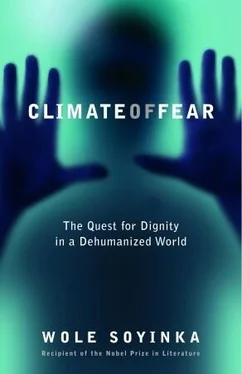Is it perhaps no more than a deadly mutation of ambition, one that may or may not translate into social activity? Any fool, any moron, any psychopath can aspire to the seizure and exercise of power, and of course the more psychopathic, the more efficient: Hitler, Pol Pot, Idi Amin, Sergeant Doe, and the latest in the line of the unconscionably driven, our own lately departed General Sanni Abacha — all have proved that power, as long as you are sufficiently ruthless, amoral, and manipulative, is within the grasp of even the mentally deficient. So, power is really neither efficacy nor a mandatory facilitator of vision or political purpose. Of course the pursuit of power may be impelled by vision, but power in itself is not to be mistaken for vision. On the contrary, true vision may eschew power, may totally repudiate power, seeking to fulfill itself by that hardy, self-sacrificial route that does not lean on the crutch of power. There are individuals in every field of human endeavor who have pursued their vision, and in a multiplicity of fields — to the benefit of millions and tens of millions around the world — without that promiscuous facilitator named power. And power, let us stress just once more, need not be an individual aspiration; it can be no more than mere participation in a collective exercise, a variant that is the intriguing and proliferating arm of hegemonic obsession of a unit within a totality.
Since I do not believe that we shall ever arrive at a satisfactory explication of power, I have settled for that functional one — that is, a definition that enables us to proceed to the social neutralization of this affliction whenever it rears its head. After all, the manifestation of raw power is an encounter that is inevitable right from infancy, and through the normal course of existence — be it in a rainstorm, the force of lightning, or an earthquake. Even the casual wind that takes down a rotten branch or a roof or two is a manifestation of the hidden force of Nature that suddenly exercises its authority from time to time, and without any intervention from man. Nature, therefore, sometimes reveals herself as a pure expression of power — and it is perhaps somewhat more than an anthropomorphic conceit to suggest that man, in those activities that incline him toward the exercise of dominance, is merely attempting a crude appropriation in response to that elemental attribute that is an expression of the very forces that surround and threaten to overwhelm him, not least of which is mortality.
In short, power is, paradoxically, the primordial marshland of fear, from which emerges the precipitate of man’s neurotic response to mortality. Therein he proceeds to attempt to match himself with the force of Nature, that agency through which the various apprehensions of God, Super Being, or whatever name— including Death — are filtered. You cannot, however, contain within yourself the elemental force of death, godhead, a thunderstorm, an earthquake, or a volcano, never mind the comparison of some energetic types to a whirlwind. Those who take such metaphors personally are subject matter for traditional psychiatry, and it is for this reason that ancient societies devised a number of ritualized scenarios for the banalization of power. As a dramatist, I have myself experimented with a number of rituals toward that end. Here is one — designed, however, only for the formal, not the shadowy counterpart of manifest power. It takes off from the French play-wright and exorcist Jean Genet.
A glitzy brothel, most appropriately, is the setting for Jean Genet’s ritualization of the insatiable collaborator — power — in his play The Balcony. There, the power-obsessed come periodically to act out their fantasies. Here now is a summary of my variation on Jean Genet:
Suppose we modernized Genet’s rather primitive stage mechanics to embrace the very latest in special effects, à la Steven Spielberg. Society would proceed to offer its ruler a chance to erupt with the earthquake, soar on flues of the thunderstorm, and become virtually one with the convulsion that attends the birth of new planets. Encased in a Virtual Reality capsule, a super Jacuzzi, the Maximum Leader would dominate the universe every day before breakfast. As a finale — and here I must acknowledge the inspiration of the innovation of that late leader Mobutu Sese Seko of Zaire, who soared with the sunrise and disappeared into the clouds every morning on his nation’s television — the Leader would watch the daily waste of his bodily functions morph into a celestial orb — the sun, no less — rising over the horizon, approving the beginning of a new day for his people.
After such an immersion in the utter sublimity of galactic power, any mortal must emerge with nothing but contempt for the mere pittance of awe and terror that are the normal dues from his miserable subjects. He would leave them — us — to wallow in our now unappealing state of… unbroken freedom, and the absence of fear.
I am persuaded that this is a ritualistic offering that no man-eating dictator, with the innate theatrics of that breed, could ever refuse.
Three
Rhetoric That Binds and Blinds
I propose to address this topic from two directions— one, the political; the other, the religious. Given the fact that, in the present day — and indeed, in a nearly unbroken continuum of history — both often prove to be merely two sides of the same coin, it should not be surprising if, from time to time, it would indeed appear that all we are engaged upon is tossing up, just like a coin, one two-sided notion. We watch it spin through the air in a blur of rapid alternations, and succumb to the law of gravity — known as coming down to earth — to reveal one side or the other, almost interchangeably. The sanctimoniousness that often characterizes one— the political — on the one hand, and the sacrosanctity that is claimed as the foundation of the other, even when it extends its constituency to the political and the mundane, make it clear that they are both claimants to the same highway of influence and control of human lives whose ultimate destination is power — the consolidation of power in itself, or the execution of policies that aspire to the total control of a polity.
Thus, the president of a powerful nation addresses a political situation in what amounts to the language of revelation tinged with messianism. Nearly on the other side of the globe, a religious leader whips up his citizens in a frenzy of alarm whose tenor is that the very salvation of their collective soul — and only incidentally the survival of the state — is jeopardized. In the hysterical condition that is aroused in the populace, hundreds of youths are sentenced to be hanged for the crime of being “agents of Satan,” “enemies of God,” and so on. Back again on the other side, wars of dubious justification are launched, humanity is savaged, the globe destabilized, and all rhetoricians of power sleep soundly, until it is time for the next hysterical whip-up. The coupling within “for God and country” is no historic accident.
Let me, as we proceed, call attention to the fact that hysteria is not always an outwardly expressed abnormality, usually loud and violent. In fact, there is the quiet form of hysteria, as medical experts will testify. Hysteria can also manifest itself as a collective and infectious outbreak, one that cannot always be accurately traced to a logical causative event. At its most affective, it emerges as the product of a one-way communication — a monologue, in short — that succeeds in blinding its followers to the very realities that surround them while sealing them in a community of conviction, even of the unresolved kind. That condition is indifferent to verification of the content of what is being communicated, indifferent to the moralities or justice — if any — of its claims, or the probable consequences of its pursuit. The moment is all, and creates for each affected member a highly solipsistic existence within a charmed circle, whose only reference point is that infinite moment of mass excitation. The rhetorical hysteria that is produced in such circumstances often dissipates soon after, but not always. Numbers promise more than safety, as in “safety in numbers”—they often guarantee certitude and invulnerability. Thus the collective conviction that sustains the individual may be dissipated with the physical dispersal of the crutch of numbers — let us say, after a political or religious rally. In such a case, the pathology of the moment is redressed by a return to reality, and each individual regains his or her whole being — until the next time.
Читать дальше












